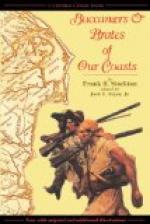Chapter II
Some Masters in Piracy
From the very earliest days of history there have been pirates, and it is, therefore, not at all remarkable that, in the early days of the history of this continent, sea-robbers should have made themselves prominent; but the buccaneers of America differed in many ways from those pirates with whom the history of the old world has made us acquainted.
It was very seldom that an armed vessel set out from an European port for the express purpose of sea-robbery in American waters. At first nearly all the noted buccaneers were traders. But the circumstances which surrounded them in the new world made of them pirates whose evil deeds have never been surpassed in any part of the globe.
These unusual circumstances and amazing temptations do not furnish an excuse for the exceptionally wicked careers of the early American pirates; but we are bound to remember these causes or we could not understand the records of the settlement of the West Indies. The buccaneers were fierce and reckless fellows who pursued their daring occupation because it was profitable, because they had learned to like it, and because it enabled them to wreak a certain amount of vengeance upon the common enemy. But we must not assume that they inaugurated the piratical conquests and warfare which existed so long upon our eastern seacoasts.
Before the buccaneers began their careers, there had been great masters of piracy who had opened their schools in the Caribbean Sea; and in order that the condition of affairs in this country during parts of the sixteenth and seventeenth centuries may be clearly understood, we will consider some of the very earliest noted pirates of the West Indies.
When we begin a judicial inquiry into the condition of our fellow-beings, we should try to be as courteous as we can, but we must be just; consequently a man’s fame and position must not turn us aside, when we are acting as historical investigators.
Therefore, we shall be bold and speak the truth, and although we shall take off our hats and bow very respectfully, we must still assert that Christopher Columbus was the first who practised piracy in American waters.
When he sailed with his three little ships to discover unknown lands, he was an accredited explorer for the court of Spain, and was bravely sailing forth with an honest purpose, and with the same regard for law and justice as is possessed by any explorer of the present day. But when he discovered some unknown lands, rich in treasure and outside of all legal restrictions, the views and ideas of the great discoverer gradually changed. Being now beyond the boundaries of civilization, he also placed himself beyond the boundaries of civilized law. Robbery, murder, and the destruction of property, by the commanders of naval expeditions, who have no warrant or commission for their conduct, is the same as piracy, and when Columbus ceased to be a legalized explorer, and when, against the expressed wishes, and even the prohibitions, of the royal personages who had sent him out on this expedition, he began to devastate the countries he had discovered, and to enslave and exterminate their peaceable natives, then he became a master in piracy, from whom the buccaneers afterward learned many a valuable lesson.




